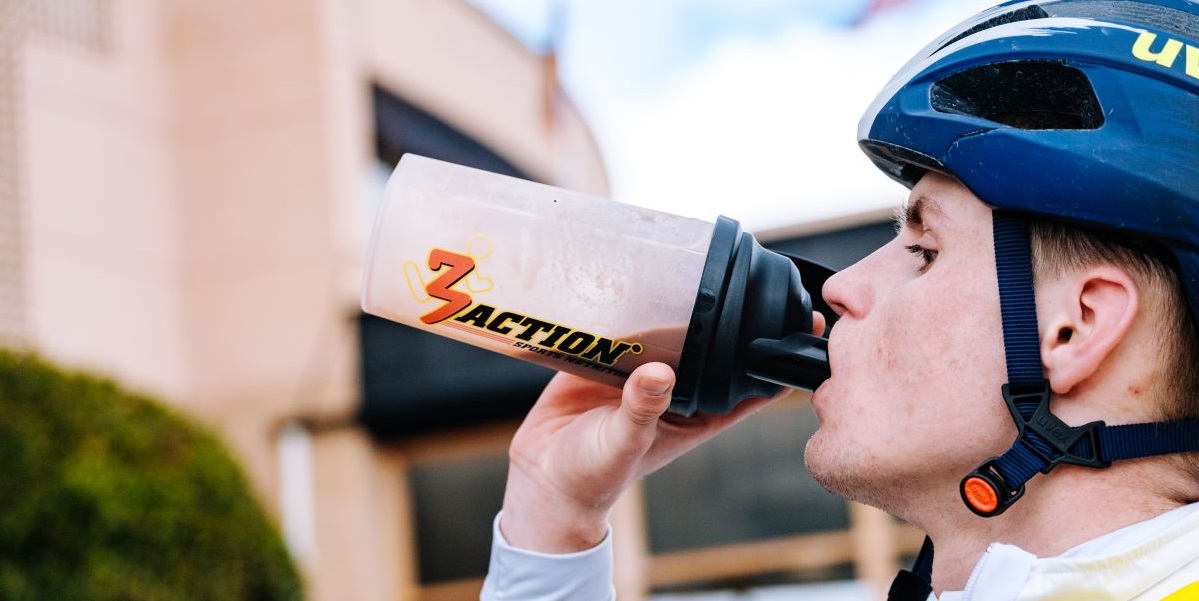
Do you often suffer from injuries? Do you have an important sporting event soon and do you absolutely want to avoid injuries? Then be sure to read the blog below. The sports dietician of 3Action Sports Nutrition is happy to explain to you what the impact of sports nutrition and supplements can be on injury prevention in endurance athletes. This way you are well prepared at the start.
Sports nutrition and supplements can help prevent injuries in athletes, but it is important to emphasize that they are not a magic solution and cannot be considered a substitute for a well-balanced diet and exercise program. The impact may depend on the specific supplement and the individual. In addition, nutrition and supplements are only one aspect of injury prevention, other factors include training, adequate recovery time, good technique, and appropriate equipment. Several factors, therefore, play a role in the occurrence of an injury. However, with the right (sports) nutrition and supplements you can reduce the risk of an injury.
What do we mean with the right (sports) nutrition?
You've probably heard about it: the sports nutrition pyramid. We see that basic nutrition has a large share, followed by sport-specific nutrition and sports supplements. So everything starts with a good basic diet or healthy food. If your basic nutrition is not good, this will affect your sports performance. Below are some important points for attention in the prevention of (sports) injuries:
The right nutrition plays a crucial role in optimal recovery between efforts and indirectly also in preventing injuries. To clarify, for example, when an athlete takes in too little protein, muscles cannot recover sufficiently and the risk of injury is greater, or when the body is still dehydrated from the previous effort and starts a new intensive effort. As a result of the dehydration, cramps will occur and this can lead to an injury.
Interesting supplements for athletes
Some sports supplements can be useful for injury prevention or to speed up recovery after an injury. Below are some examples:
Carbohydrates are an important source of energy for the body, especially during endurance sports. Adequate carbohydrate intake can help replenish muscle glycogen stores and reduce the risk of fatigue and injury.
Proteins are necessary for muscle recovery and muscle building after intensive exercise. An adequate intake of protein can help repair muscle damage and increase muscle strength, which can help prevent injuries. 3Action Recovery Shake is a protein-rich drink with an anti-cramp formula that supplements whey protein, carbohydrates, and minerals in one drink for a quick recovery. 3Action Whey Protein shake consists of high-quality whey proteins including a high dose of BCAAs and glutamine for ideal support for muscle recovery.
3Action Creatine (Creapure®) is a supplement that can help to provide the muscles with extra energy, muscle mass, and explosiveness, which can lead to better performance and reduce the risk of muscle injuries, but it can also be useful during the rehabilitation process for a faster recovery.
Collagen is a protein that occurs naturally in the human body and helps maintain healthy muscles, tendons, ligaments, bones, and joints. It is an important component of cartilage and connective tissue. Muscles consist of muscle fibers and these are intertwined in a network of connective tissue or collagen. With loads such as sports, the connective tissues have to absorb many blows, which can lead to injuries. Collagen supplementation can then be used in addition to the normal diet to prevent injuries and accelerate the recovery process. 3Action Collagen Protein or 3Action collagen+ contains Peptan® which guarantees high purity and high bioavailability due to its hydrolyzed form.
3Action BCAAs or Branched Chain Amino Acids (leucine, isoleucine, and valine) cannot be produced by our body and must therefore be obtained through our diet and/or supplements. They play an important role during muscle recovery and building.
Caffeine can help improve focus and alertness, which can lead to better performance and less chance of injury from distraction or fatigue. 3Action Guarana gives a stimulating effect, dispels fatigue, and increases concentration and energy during exercise.
Magnesium supplements can help prevent muscle cramps and muscle tension, which can lead to injuries. Due to physical exertion and sweat loss, athletes have an increased need for magnesium. 3Action Magnesium Xtra is a liquid supplement with extra magnesium and vitamin C.
3Action Vitamin D contributes to the maintenance of normal bones, normal muscle function, and the immune system. Moreover, athletes often have an increased need, and supplementing vitamin D deficiencies in athletes can improve sports performance and reduce the risk of injuries.
Although sports nutrition and supplements can help prevent injuries, it is important to note that they cannot avoid all possible causes of injuries such as overtraining. A varied, balanced diet with sufficient macronutrients (carbohydrates, proteins, and fats) and micronutrients (vitamins and minerals) is the first step in recovery and injury prevention. Do you have any questions? Feel free to send us an email to info@3actionsportsnutrition.com
- Michaline Lon, sports dietitian -

Contact us from Monday to Friday from 9 am to 5 pm

Our website uses the 100% secured Mollie (SSL)

Fast and secure delivery via bpost/UPS